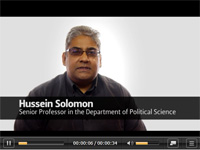Latest News Archive
Please select Category, Year, and then Month to display items
08 August 2023
|
Story EDZANI NEPHALELA
|
Photo EDZANI NEPHALELA
 Mbulelo Aven Jafta, Xhariep Municipality Corporate Services Director, and Dr Engela van Staden, Deputy Vice-Chancellor: Academic at the UFS, sign a memorandum of understanding to enrich various communities in the Xhariep Municipality areas through leadership training.
Mbulelo Aven Jafta, Xhariep Municipality Corporate Services Director, and Dr Engela van Staden, Deputy Vice-Chancellor: Academic at the UFS, sign a memorandum of understanding to enrich various communities in the Xhariep Municipality areas through leadership training.
The University of the Free State (UFS) has signed a memorandum of understanding with the South African Local Government Association (SALGA) and the Xhariep Municipality that is aimed at positively impacting communities through strategic partnerships. The organisations plan for their collaboration to make a significant difference by training 35 of their employees via the UFS Business School – 15 will undertake the Foundation Skills Short Learning Programme, and 20 the Bachelor’s degree in Management Leadership.
This joint effort will equip these employees with essential skills and knowledge and empower them to carry out their responsibilities efficiently and effectively. Rooted in the UFS’s Vision 130, this initiative fosters positive change within the community by enhancing social justice and innovation.
Dr Engela van Staden, Deputy Vice-Chancellor: Academic at the UFS, emphasised the university's dedication to human resource development and empowering individuals. “We were very excited when we got this engagement with you, and I hope it will be fruitful for you, because that’s the intention. We are also reaching out to other municipalities because we are doing it for our country, and the sooner we do it, the better the services you will deliver to people.”
Xhariep Municipality expressed gratitude for the collaboration, recognising its significance in empowering its employees. Mbulelo Aven Jafta, Corporate Services Director at the municipality, thanked the university for accepting the partnership. “As a municipality, we are interested in capacitating our employees to perform their duties optimally. It is through these partnerships that we reach our intended targets. This is the first two projects, and many more will be coming as our partnership progresses, and we intend to use this opportunity to the best of our abilities.”
Jafta said that such partnerships encourage a more interconnected and interdependent world. “As organisations work towards common goals, they create a ripple effect that can lead to a brighter and more promising future and play a vital role in shaping a positive and sustainable future.”
Islam. Boko Haram. Terrorism. Prof Hussein Solomon offers insight.
2014-09-04
 Photo: en.wikipedia.org |
Prof Hussein Solomon introduction: video

When it comes to politics, there are lots of negative talk, but without any action or solutions.
However, with Prof Hussein Solomon, Senior Professor at the UFS’s Department of Political Science, there is not a lot of talk without solutions, but great activity regarding research work published on Islam, the Middle East, Boko Haram and environmental issues in Africa.
Prof Solomon’s most recently published article, Five Lessons Learned from Ejecting Islamists in Mali, was published in the Research on Islam and Muslims in Africa (RIMA) Policy Papers on 1 September 2014.
(https://muslimsinafrica.wordpress.com/2014/09/01/five-lessons-learned-from-ejecting-islamists-in-mali-professor-hussein-solomon/ ).
“The terrorist threat is mounting with each passing day in Africa with Islamist terror groups exploiting the ungoverned spaces, the availability of weapons, porous borders, an incompetent security apparatus and corruption in the political establishment,” Prof Solomon writes in this paper.
“It is therefore important, to explore cases where attempts have been made to dislodge the Islamists with a view to learn lessons so that future interventions do not repeat the failures of the past. This paper explores the intervention and lessons which could be learned from French and Economic Community of West African States (ECOWAS) attempts to oust Islamists in northern Mali in 2013.”
Prof Solomon holds a DLitt et Phil (Political Science) from the University of South Africa (UNISA). In 2011, he was Visiting Professor at the Osaka School for International Public Policy (OSIPP). In 2007 and 2010 he was Visiting Professor at the Global Collaboration Centre at Osaka University in Japan and in 2008 he was Nelson Mandela Chair of African Studies at Jawahrlal Nehru University in New Delhi, India. In 1994, he was Senior Visiting Fellow at the Department of War Studies, King’s College at the University of London. He is currently a Visiting Fellow at the MacKinder Programme for the Study of Long-Wave Events at the London School of Economics and Political Science in the United Kingdom.
He is also a Senior Associate for the Israeli-based think tank Research on Islam and Muslim in Africa and a Senior Analyst for WikiStrat.
More articles by Prof Solomon:
Boko Haram and the case of the abducted school girls
http://muslimsinafrica.wordpress.com/2014/05/14/reinvigorating-the-fight-against-boko-haram-professor-hussein-solomon/
Australian Broadcasting Corporation interview on Boko Haram
http://www.abc.net.au/radionational/programs/counterpoint/boko-haram/5657882
Reflections on Inga 3 and Beyond
www.saccps.blogspot.com
Nile and Okavanga River Basins (pdf)
Nigeria’s Boko Haram: Beyond the rhetoric (pdf)